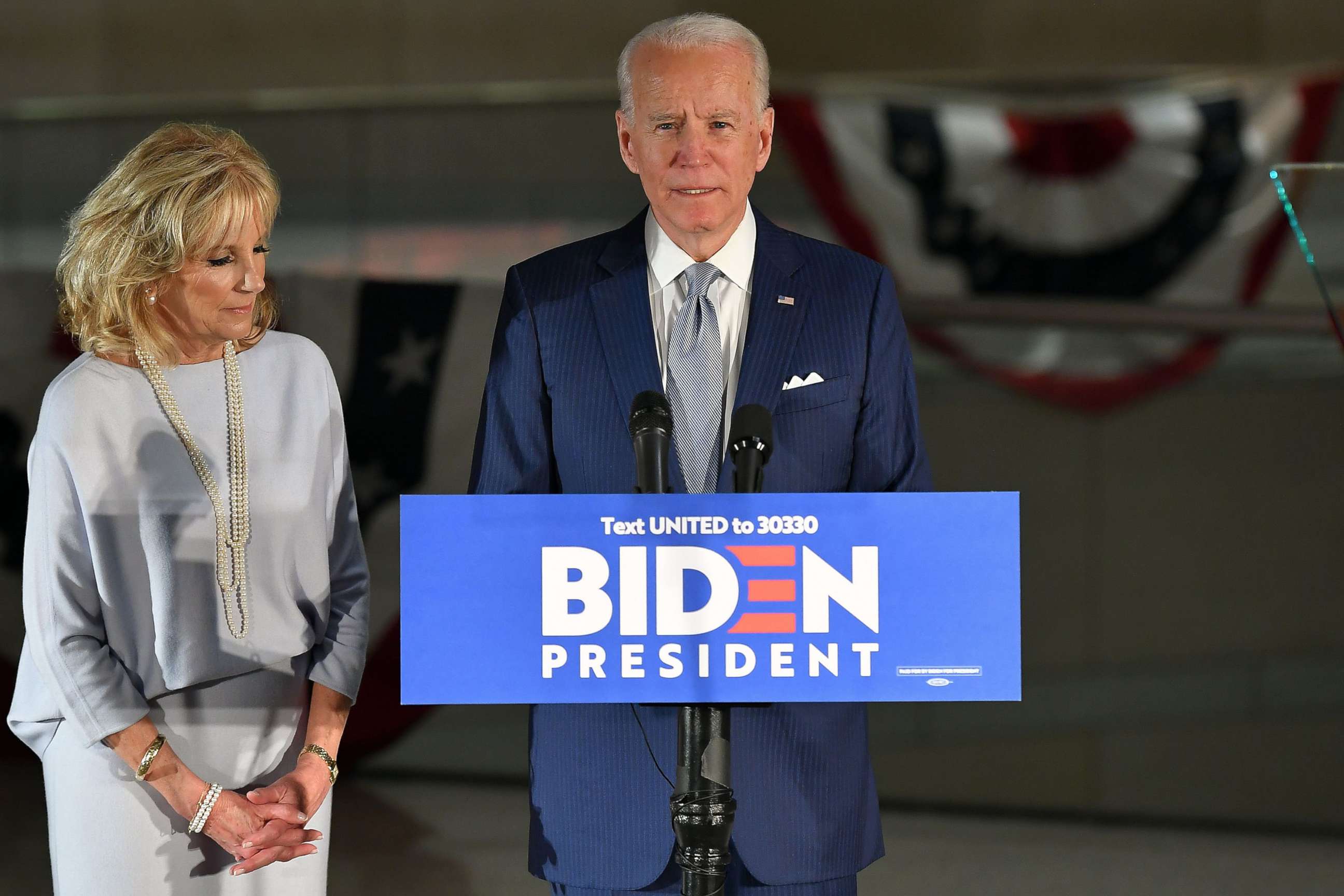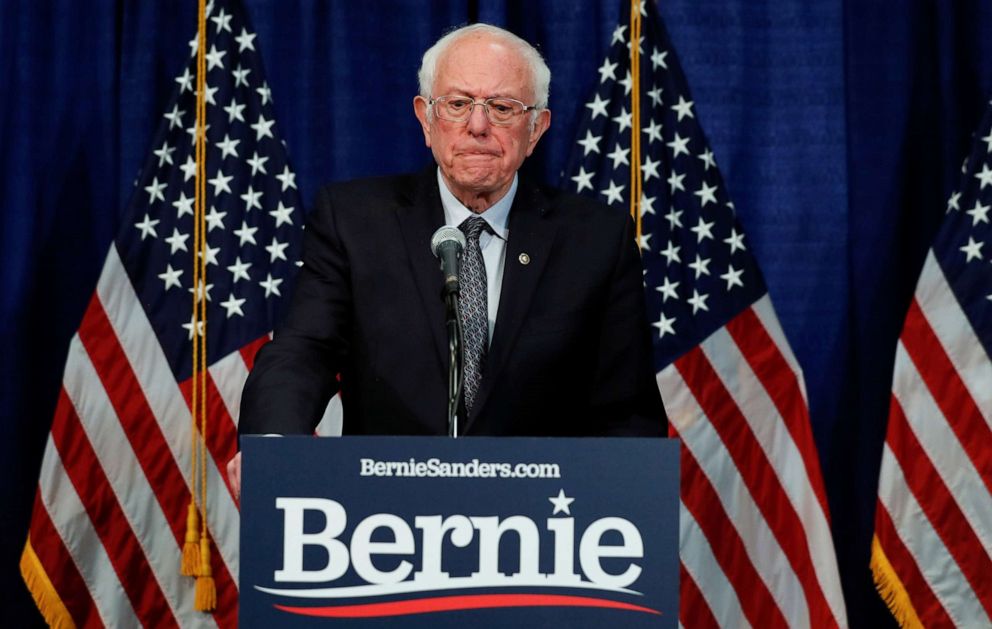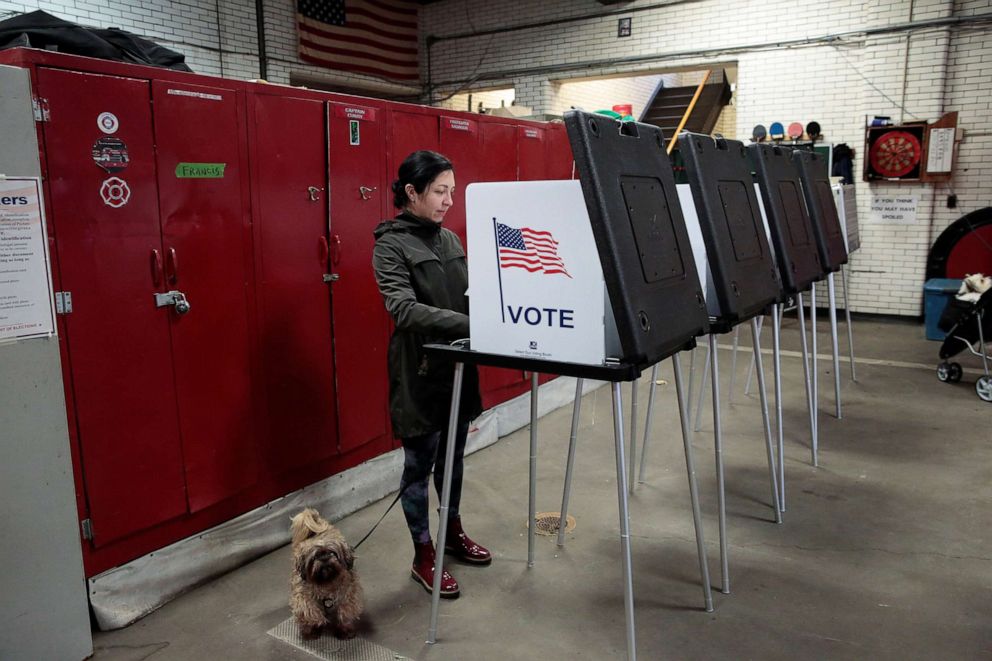The Note: Biden gets presidential moment as campaign pauses amid health crisis
The campaign that was moving too fast has suddenly ground to a halt.
The TAKE with Rick Klein
The campaign that was moving too fast to keep up with has suddenly ground to a halt.
The Democrats don't have a presumptive nominee, but neither do they have an active fight for the nomination at the moment. Campaigning itself is off, just one consequence of a nation on edge over what's now a global pandemic.
Out of that comes former Vice President Joe Biden. He speaks in Delaware on Thursday, not on politics -- at least on the surface -- but on public health, on the topic of presidential leadership and how he would confront the novel coronavirus.

President Donald Trump put forward his most dramatic response to date Wednesday night, speaking from the Oval Office. His approach includes a travel ban between most of Europe and the U.S., and tax-relief packages he's proposing to lessen the economic impact of what he called a "foreign virus."
But coronavirus is already here, dramatically and even terrifyingly so. This crisis won't fit into any partisan framing, or any lingering intra-party fighting. House Democrats are moving forward with proposals for paid sick leave and free testing -- items Trump didn't address on Wednesday.
Biden's rise in the campaign has been fueled by a sense that he is ready to lead, and best-equipped to take on Trump. The president runs the risk of looking a beat behind at a critical time for the nation; his address came at almost the same moment that the NBA announced a suspension of its season and the news that Tom Hanks and his wife, Rita Wilson, tested positive for coronavirus.
This is shaping up as a moment that will define a president's legacy. It could also define the trajectory of a would-be president who stands on the cusp of the Democratic nomination.
The RUNDOWN with MaryAlice Parks
Decoding Sen. Bernie Sanders' speech Wednesday, it is clear he does not think Biden's argument for a return to the Obama years alone is going to cut it in November.
Sanders may be dead wrong, but his anxiety is palpable, and the fact that is where his head is should not be that surprising.
After all, four years ago Sanders decided to run and oppose a different candidate who was, in large part, pitching a continuation of the Obama administration. He was not satisfied then and went on to watch Hillary Clinton lose.

This go-around his team claimed his record on the issues was his best argument for his own electability. Voters so far have not been buying it, to say the least.
But defiantly, Sanders has persisted, arguing over and over that a Democratic candidate on the wrong side of issues like trade, foreign policy and income inequality -- as he sees those issues, of course -- would have a tough time in a general election.
His statement Wednesday was him underscoring this point and making public his checklist for any potential candidate: have a plan on to fight climate change, medical debt and the cost of health care in general; clarify your exact position on the concept of government-issued health insurance; be willing to tackle student loan debt, the price of college and income inequality in a big way; and do not disrespect young voters.
While unclear about a lot what comes next for his campaign, Sanders was stark about what he thinks it will take for anyone to beat a sitting president.
The TIP with Quinn Scanlan
Since before voting even began, Sanders had argued that the way the Democratic nominee beats Trump is by bringing out "the largest voter turnout in history," and he's pitched himself as the candidate most up to the task, often while touting his overwhelming support among young people.
But from where the race stands right now, with only about half of the total delegates still up for grabs in the remaining contests, Biden seems to be the candidate with a stronger claim to delivering that turnout.

Only five states have broken records set in 2008's primary for number of ballots cast. The three with the largest delegate hauls -- Massachusetts, South Carolina and Virginia -- all went for Biden, and in the latter two contests, the former vice president beat Sanders by about 30 points.
While Sanders prevailed in the other two record-breaking states -- Vermont and New Hampshire -- collectively, they account for only 40 pledged delegates, and one is his home state, and the other is its neighbor.
Michigan, which voted on Tuesday, saw a nearly 30% increase in Democratic primary participation compared to last cycle, according to the state party, but while Sanders eked out a win over Clinton in the state in 2016 -- with where the vote stands now -- Biden has a 17 point lead over the Vermont senator.
A state widely considered to be a "must win" for Democrats come November, Biden's clear victory over Sanders there only adds merit to the claim he made in Philadelphia on Tuesday night: "We're bringing this party together."
THE PLAYLIST
ABC News' "Start Here" podcast. Thursday morning's episode features ABC News Chief Medical Correspondent Dr. Jennifer Ashton, who tells us what to think about novel coronavirus now that the World Health Organization declared the virus a pandemic. Then, ABC News Deputy Political Director MaryAlice Parks analyzes Sen. Bernie Sanders' path forward against former Vice President Joe Biden. http://apple.co/2HPocUL
FiveThirtyEight Politics Podcast. In a late-night edition of the FiveThirtyEight Politics podcast, the crew reacts to the results from Tuesday night's elections in Michigan, Missouri, Mississippi, North Dakota, Idaho and Washington. They also ask if the Democratic primary is over, given former Vice President Joe Biden's good night. https://53eig.ht/2TrN6xE
WHAT YOU NEED TO KNOW TODAY
Download the ABC News app and select "The Note" as an item of interest to receive the day's sharpest political analysis every weekday.
The Note is a daily ABC News feature that highlights the key political moments of the day ahead. Please check back tomorrow for the latest.




